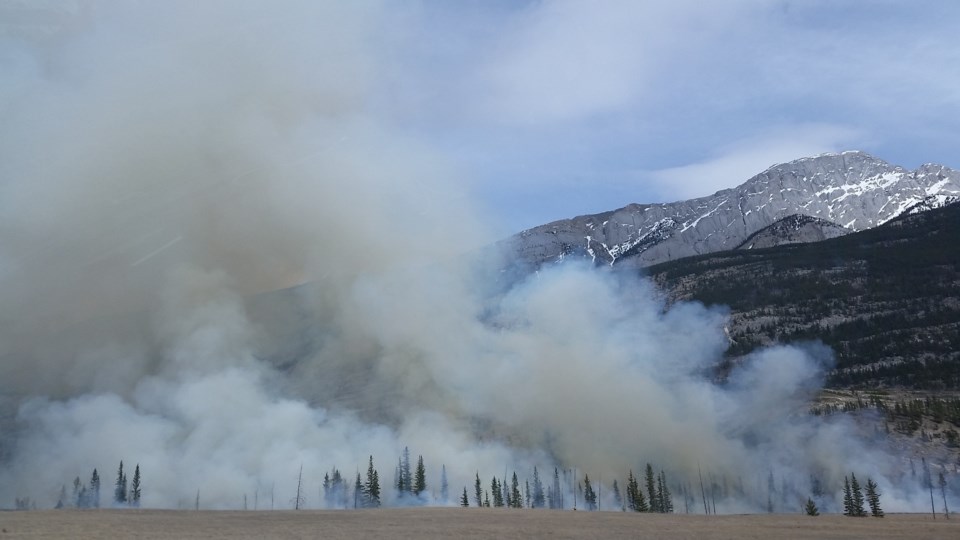The University of Northern British Columbia and the University of Alberta are conducting studies to learn more about how firefighting activities affect the health of fire crews.
"There is really no data that tells us about the long-term effects on the respiratory system of working year after year as a wildland firefighter," said Dr. Nicola Cherry, who serves as the tripartite chair of occupational health with the Division of Preventive Medicine at the University of Alberta.
Fighting wildfires is thought to place firefighters at risk of asthma, lung diseases and mental-health issues.
Cherry's work will examine the nature and concentration of polycyclic aromatic hydrocarbons (PAHs) in the air that firefighters breathe and accumulate on their skin.
PAHs are a suite of organic compounds produced when organic material burns, some of which can be carcinogenic.
Cherry's work in B.C. will look at the relationship between skin hygiene and the absorption of PAHs. "We are measuring the exposure by looking at concentrations of a metabolite of PAHs in the urine before the shift, after the shift, and the next morning," she explained.
To measure that difference, her team of researchers broke the sample set into two groups: wildfire fighters who showered and put on clean clothes immediately after a shift, and those who didn't. Results are forthcoming.
Cherry has previously worked with firefighters in Alberta on a similar project, where her research showed that the firefighters who were on the ground in the early days of the Fort McMurray fire and had little opportunity for skin hygiene had "heavy exposure" to PAHs .
The study also showed that there were long-term consequences of such exposure. "We also showed that people who got very high exposures to particulates in the first days of the fire seemed to have ongoing respiratory problems," said Cherry.
The fact that there were fewer wildfires in B.C. this year than in previous years presented a challenge for her team, she explained.
"There weren't all that many fires this summer," said Cherry. "So when [the BC Wildfire Service] knew there was going to be a fire, we would rush down and set up camp and then measure the firefighters who volunteered."
Cherry's work will also explore the practicality and effectiveness of using respiratory protective equipment when fighting wildfires.
Some of the firefighters her team worked with volunteered to wear them, allowing her team to measure their effectiveness in terms of preventing the inhalation of PAHs or vapours.
"We've got no results from the labs [yet], but we do know [that wildfire fighters] complain less of coughing symptoms the next morning if they have been wearing [respiratory protective equipment]," she said.
Wildfire fighters don't traditionally wear the devices, she said, noting the extremely physical nature of the job.
Cherry's investigation will also explore whether wildfire fighters suffer chronic lung disease at a greater rate than other people of the same age, gender and geographic location.
A progress report on the initial phase of this project is expected in March 2020.
Cherry's work is being undertaken alongside that of Chelsea Pelletier, an assistant professor with the School of Health Sciences at the University of Northern British Columbia (UNBC).
The BC Wildfire Service has provided $305,000 to help fund the B.C. research projects.
Pelletier was unavailable for an interview, as the UNBC Faculty Association, which represents teaching staff, is currently on strike
But according to a release from the province, her work will conduct a global scan of the scientific literature on wildfire fighter health and wellness.
The work will be drawn on to identify any modifications that could be implemented to reduce potential health impacts of the job, and identify gaps in the research.
According to the province, the Pelletier's work is expected to be complete by the summer of 2020, and the "outcomes of this project and other information will help the BC Wildfire Service establish a long-term research strategy for worker health."
The research projects come at a time of increased awareness of the threat of wildfires and interest in their health effects.
Cherry spoke to Pique shortly after attending a conference in Fort McMurray where researchers shared their wildfire-related analysis with the public.
Lessons from several federal-government-funded projects were shared.
"I think it was an important conference because the community had gotten ideas that weren't necessarily supported by the data," said Cherry.
"For example, there was a group who did a study that looked at the dust in people's houses and a year later didn't find any [concentrations of] chemicals that [were of] any concern."



